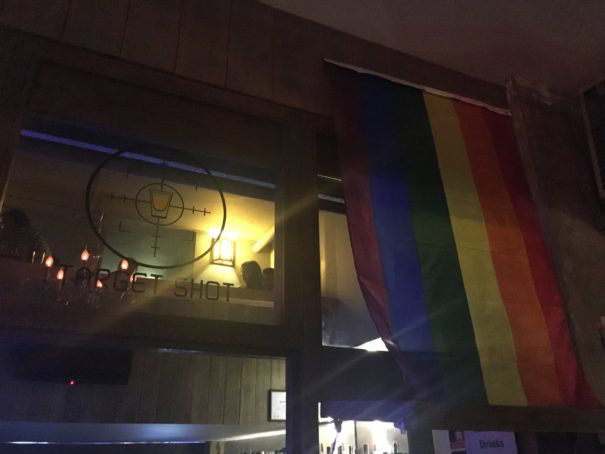
Tolerance, Tension, and Many Moscow Mules: A Dispatch from Beirut Pride

Tolerance, Tension, and Many Moscow Mules: A Dispatch from Beirut Pride
Moscow Mules in Beirut
It’s 10:19 p.m. A woman honks her horn. (No reason.) A pack of young men, doubtlessly dreaming of conquests—or shawarma—guzzle beers outside of a store. In Mar Mikhael, a grimy district that has served as an enclave for Beirut’s pseudo-hipsters and garden-variety boozers since 2013, a familiar cacophony rises: beats, banter, horns, squealing tires, and roaring engines.
A crowd cheers. They’re at Radio Beirut—a bar, radio station, and performance venue—to celebrate Beirut Pride week, the first LGBT awareness campaign of this size and scope in the Arab world. An intrepid young man has scaled the balcony to hang the rainbow flag above the bar. Edging past a skeptical bouncer, I order an Almaza Draft—an unimaginative pilsner that means much to me emotionally, despite its generic taste. Comfort Brew.
This beer is weak. I order a Moscow Mule: vodka, ginger beer, and—in a Beirut twist—cucumber and basil instead of lime. Before I can take a sip, I spot Hadi Damian. He’s the frenetic, but friendly, Francophone who “initiated” Beirut Pride. “Are you having fun?” he checks, hugging me. “Alright, finish your drink. You’re coming with me.”
With his friend Danya, we race through half of the 23 bars flying the rainbow flag that night. At one bar, the flag seems to have gone missing. “It’s probably one of our younger folks,” Danya reassures me, though I’m more concerned about my next zesty beverage. “They’re all excited and keep asking about where they can buy a flag.” The flag causes some commotion at another bar. “The owner was incredibly helpful and supportive last night,” Danya explains, “but his staff, being macho men, huffed and puffed about it tonight.”
We careen down a nearby alley, stopping at another three bars—all owned by straight Lebanese men, all flying the flag and handing out bracelets. At Barclays, we order more Moscow Mules. Between asides on Paris, Seattle, and the merits of unisex fashion, Hadi explains that, “Beirut Pride is not a movement. It’s a platform. It’s collaborative, and is not affiliated with any political party or embassy. We don’t even take corporate money.”
That’s all great, though it sounds a tad rehearsed. Even so, people—gay, straight, Lebanese, foreign—must pursue self-fulfillment and self-expression under their state’s governing laws and society’s prevailing norms. Sure, Lebanese judges have sometimes interpreted laws progressively, but those laws, like Penal Code Article 534, which essentially criminalizes any sexual act that is deemed unnatural, make progress precarious—and subject to arbitrary and capricious courts.
Even in the Beirut bubble, far too many people—including activists, writers, and lawyers who should know better—often mistake consumerism, hedonism, escapism, or exhibitionism for liberalism. And they mistake separation for tolerance. Gathering in hedonistic hotspots, they put on liberal airs because, as my new-found friend “Q.I.” says, “they feel pressure to pretend like they’re open-minded. They want to drink and dance. But they’re not really liberal.”
S.P., the gay son of a Lebanese government official, chimed in: “Just look at the venues that agreed to host events, but cancelled under pressure, or for what they said were ‘commercial’ reasons. Garbage.” On May 14, under pressure for the League of Muslim Scholars, a hotel cancelled Beirut Pride’s launch—a full day of presentations and forums on LGBT issues and rights.
On the other hand, Beirutis enjoy and assert a robust sort of self-expression that just isn’t possible in most of the states and societies of the Middle East. Hundreds of people flooded Mar Mikhael—or turned up to events all week—to celebrate Beirut Pride. For all its faults, Beirut can be a tolerant place. It is, at least, a place that tolerates its tolerant spaces.